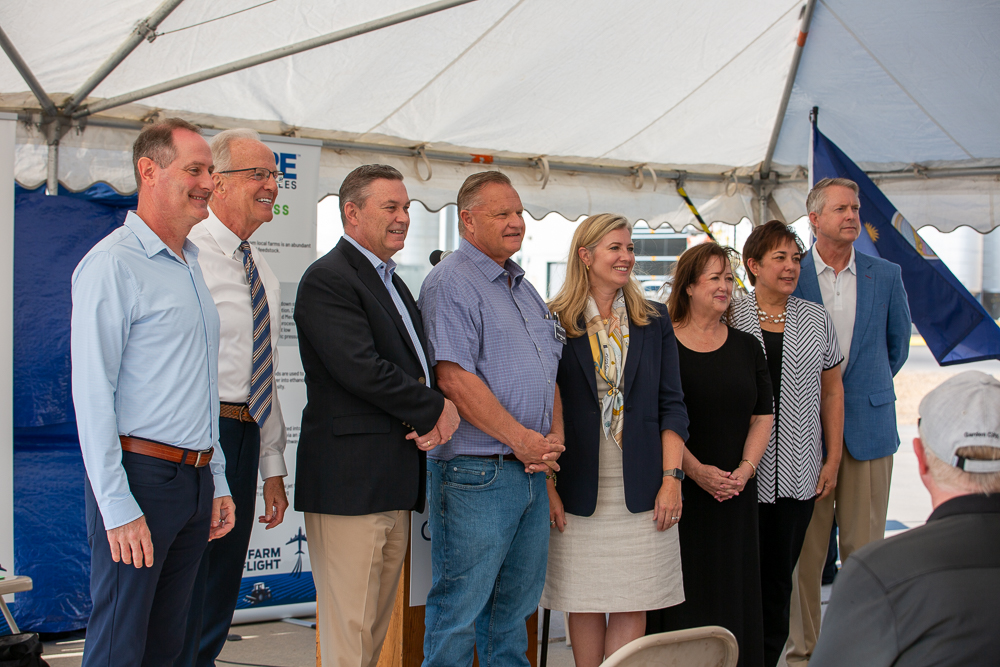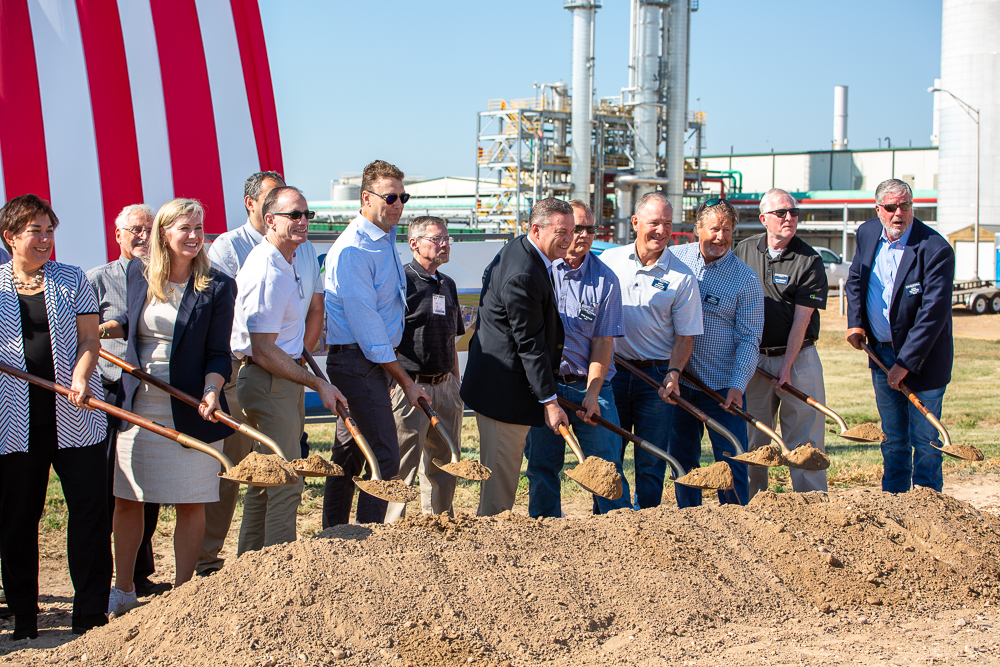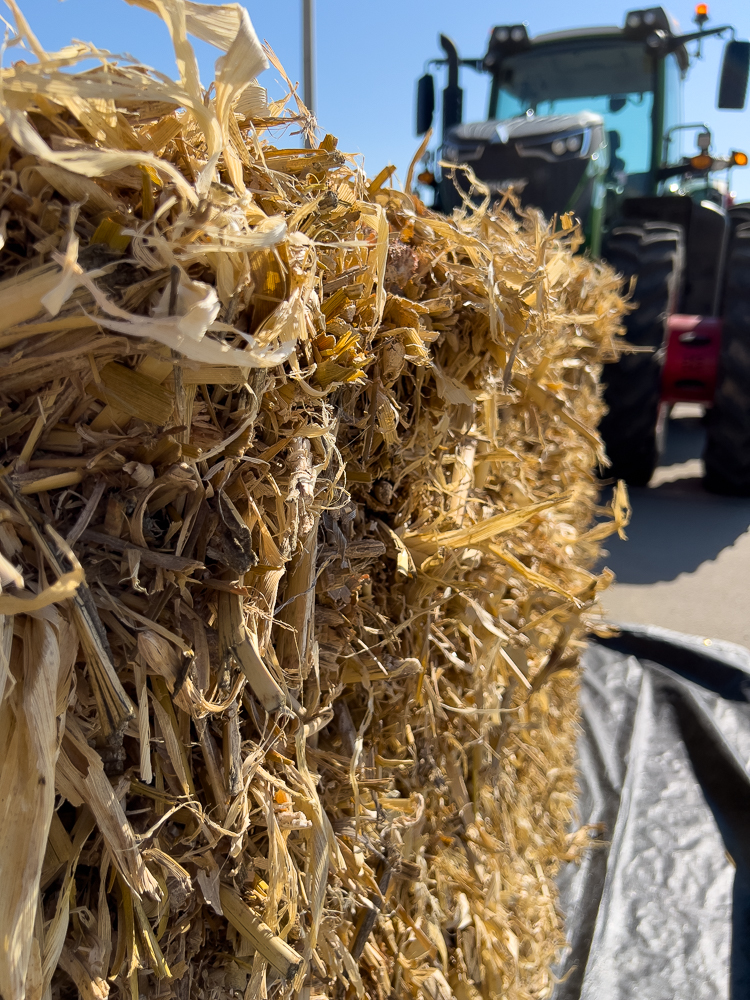Plant groundbreaking to help scale up sustainable aviation fuel, boost local economy

Conestoga’s Arkalon Energy ethanol facility provided the backdrop for the groundbreaking of SAFFiRE Renewables in late August.
Federal, state, local and commodity group officials attended the event for a new pilot plant focusing on large-scale commercialization of cellulosic ethanol in Liberal, Kansas.
Once built and operational, the ethanol will be converted to sustainable aviation fuel by utilizing the alcohol-to-jet pathway. Officials said by transforming corn stover into ethanol, SAFFiRE’s novel technology approach has the potential to fuel aviation’s green transition and positions the U.S. agriculture and ethanol industries at the forefront of SAF growth.
Partnering with the U.S. Department of Energy Bioenergy Technologies Office, National Renewable Energy Laboratory, Idaho National Laboratory, and Conestoga Energy intend to open a facility designed to turn agriculture residue into a scalable biofuel business. According to officials, by investing in these technologies, the new facility is expected to create good-paying jobs and enhance education and training opportunities to build the bioenergy workforce providing the local economy with 500 new jobs and $92 million in total economic activity.
Tom Willis, CEO and president of Conestoga Energy Holdings, LLC, told attendees this “is a huge deal.” Nearly 19 years ago, the Arkalon site was a vacant field, but today produces more than 2 billion gallons of renewable, clean energy for the country, he said.
“Remember today,” he said. “This is a day in which western Kansas goes from producing natural gas energy and the start of producing sustainable aviation fuel with our partner SAFFiRE.”
A plant like this could be a game changer for western Kansas, and the airline industry alike, according to Willis.
“This is transformational for agriculture and the value that it brings,” he said. “Eastern Kansas is known for building aircraft. Western Kansas is going to be known for fueling aircraft.”
Many thanks
Tom Nealon, SAFFiRE Renewables CEO, gave many thank yous at the groundbreaking and he started with Willis. The Liberal location has ideal assets with rail access combined with corn production, he said.
Nealon explained why Southwest Airlines is interested in sustainable aviation fuel.
“Our objective, and pretty much the objective of the entire U.S. aviation industry, is to achieve carbon neutrality by 2050 and the challenge with that is there’s not a way to do it today.”
To get there the airline industry is going to need new propulsion technology, new engines, new aircraft, he said, but that will take more than 20 years to occur. The design process will take 10 or 15 years just by itself, and in the meantime, airlines are still buying their current aircraft fleets. The transition could likely happen between 2050 and 2070.
“Southwest today burns about two and a half billion gallons of Jet A, and that will grow to three to three and a half billion gallons of Jet A,” he said. “The U.S. aviation industry will burn 35 billion gallons of Jet A in the coming decade or two. So there’s a tremendous need for sustainable aviation fuel. We happen to be huge believers in ethanol at Southwest Airlines.”
The ethanol SAFFiRE is going to produce is called a second-generation ethanol product since it’s made with corn stover.
He hopes to achieve between 110 and 150 million gallons of cellulosic ethanol being produced at the plant.
Ag growth spurred
U.S. Sen. Jerry Moran also recognized the importance of the groundbreaking and agreed with several other speakers before him how important a plant like this one is for the agricultural producers in southwest Kansas.
“Kansas comes together in this renewable effort to find the opportunity to meet the needs of the aviation industry with renewable fuels,” the Kansas Republican said. “I was here for the groundbreaking of the (Conestoga) ethanol plant and look what we have today and what benefits it’s provided to farmers across the region, to this community and people who work here.”
Moran sees the new plant as another opportunity for Liberal and surrounding area. The partnership with SAFFiRE and Southwest and the plant is an example of the partnerships between the community, business and their boards, as well as farmers across the state, according to Moran.
Federal Aviation Administration Central Region Deputy Regional Administrator, Debra Sanning said it was a great example of a public and private project.
“When I look around the room today and I see this level of commitment of federal, state, city, local leaders, this is huge,” she said. “This really underscores the commitment to this project.”
Sustainable agriculture has long been a focus in Kansas—keeping the soil healthy and keeping food supplies safe.
“But look now, with the byproducts of corn stover what can be done, and this innovation, this grit and this determination is in the history books,” Sanning said. “When Tom was talking about marking your calendar, he’s right. This is a big deal. We are in a new era of aviation.”

Another renewable success story
Emily Skor, CEO of Growth Energy, congratulated those in the ethanol industry, and said her organizations represent about 10 billion gallons of production.
“I spend a lot of time talking about the promise of sustainable aviation fuel. But we’re here today because now it’s real, and it’s absolutely fantastic, and it’s palpable the energy and the excitement,” she said.
Skor said how proud Growth Energy is for its two members, Conestoga and SAFFiRE, as they continue to redefine the role that American agriculture can play in a low carbon economy.
“This plant has the potential, not just to be a big step for Kansas, but a huge leap forward the entire biofuels industry,” she said. “We all know the economics of cellulosic ethanol have always been challenging, but today, a new frontier is pulling corn stover bio ethanol, toward greater profitability and making America’s low carbon ambitious and more feasible at the same time.”
Sustainable aviation fuel is the next new frontier for ag and ethanol, according to Skor.
“It’s rising rapidly, and it’s a testament to the great things that are possible when we work together,” she said. “And it’s important to reflect just on the representation here in this room. We have lawmakers, we have agency officials, airlines, biofuel producers, SAF producers and farmers. We have the executive branch, the legislative branch and local officials. It takes all of us working together and a magnificent public private partnership to get to this point.”
Skor said there’s only one category of clean renewable energy that’s available in sufficient volumes to decarbonize skies, and that’s crop-based bioenergy.
The future of aviation depends on America’s farmers and bio-manufacturers in rural communities, she said. Growers and innovators can look across a field of leaves and stalks and corn cobs and believe they can turn that into jet fuel. “SAF is a billion-dollar opportunity for rural America, and it will be transformational for our economy, our environment and for communities that far too often get left behind.”
Federal outlook
U.S. Department of Energy Bioenergy Technologies Office Director Valerie Sarisky-Reed said the best part of her job is visiting communities where the work and funding has taken place.
“Breaking ground here at SAFFiRE Renewable for this pilot plant is really one of these milestones we need to celebrate as part of the sustainable aviation fuel grand challenge we launched in 2021,” she said. “The Department of Energy, Department of Transportation, FAA and Department of Agriculture, came together because we wanted to create a true, comprehensive strategy to scale up new technologies, things that I’ve been working on 30 years, to produce sustainable aviation fuel at commercial scale.”
Sarisky-Reed said there are other biofuel products available, but she believes a plant like the one near Liberal is really aviation’s best opportunity to achieve decarbonization. Partnerships have to work toward the same goals.
“The successes we’re going to see here are going to create really good paying jobs where the feedstock grows, like here in Liberal, Kansas,” Sarisky-Reed said, adding local economies will be enhanced with new educational opportunities.
Kylene Scott can be reached at 620-227-1804 or [email protected].




